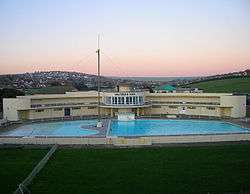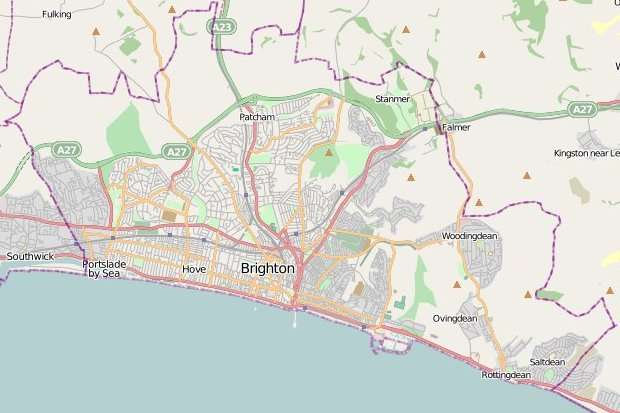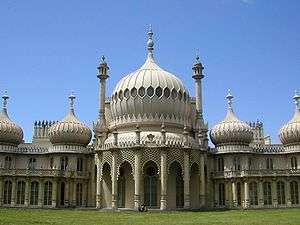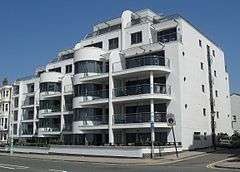Saltdean Lido
Saltdean Lido at Saltdean Park Road, Saltdean, in the city of Brighton and Hove, is an Art Deco lido designed by architect R.W.H. Jones. Originally listed at Grade II by English Heritage for its architectural and historical importance,[1] its status was upgraded further to "Grade II*" on 18 March 2011.[2]
| Saltdean Lido | |
|---|---|
 The lido from the south | |
| Location | Saltdean Park Road, Saltdean, Brighton and Hove, England |
| Coordinates | 50.801335°N 0.042162°W |
| Built | 1938 |
| Architect | R.W.H. Jones |
Listed Building – Grade II* | |
| Official name: Saltdean Lido | |
| Designated | 18 March 2011 |
| Reference no. | 481229 |
 Location of Saltdean within Brighton and Hove | |
The Art Deco design has been described by The Daily Telegraph as "particularly glorious, with its elegant, curved lines – rather like a stately ocean liner."[3]
Description
The pool measures 140 by 66 feet (43 m × 20 m)[4] and can accommodate 500 bathers.
History
The lido was built in 1937-38 to designs by the architect Richard Jones, and was hailed as the most innovative design of its type in Britain. With its tea terrace, sun deck, and café perched on the flat roof and distinctive curved wings at either end, it became the only lido to be featured in the Design Museum in London.[5]
In 1958, Butlins attempted to buy the derelict lido for development. The application was opposed by residents and eventually rejected by the Ministry of Housing.[6]
In 1998, the lido was reopened by Sports Minister Tony Banks. The restoration was achieved through a public and private sector partnership costing £2 million. Banks revealed he had a personal link to the Grade II listed building through his mother, who used to visit it during the Second World War. He said: "Open air sites are not able to attract National Lottery funding, so the money for this had to come through private investors having the vision to bring a piece of our heritage back into use." The reopening ceremony came two days after the lido let in its first visitors for three years.
On 18 March 2011, John Penrose, the Minister for Tourism and Heritage in the Department for Culture, Media and Sport, approved the upgrade of Saltdean Lido's listed status from Grade II to the second highest grade, Grade II*.[2] Such buildings are defined as being "particularly important ... [and] of more than special interest".[7]
On 30 May 2012, it was announced that the ownership of the Lido would be handed back by leaseholder Dennis Audley to Brighton and Hove City Council after legal discussions.[8][9]
After an extensive campaign by local residents, the Save Saltdean Lido Campaign successfully lobbied the freeholders of the site (Brighton & Hove City Council) to stop housing development and take back the lease on the site. Following a 9-month procurement process the Saltdean Lido Community Interest Company (set up by the campaign group) took ownership of a 60-year lease in 2014.
The lido reopened in 2017.[10]
See also
- Grade II* listed buildings in Brighton and Hove
- The De La Warr Pavilion
- Art Deco
References
- Historic England (2007). "Saltdean Lido, Saltdean Park Road (west side), Brighton (1380905)". National Heritage List for England. Retrieved 19 March 2011.
- Lumley, Ruth (19 March 2011). "Saltdean Lido given new protective status". The Argus. Newsquest Media Group. Retrieved 19 March 2011.
- Windig, Elizabeth (27 September 2008). "Britain's top 10 lidos". The Daily Telegraph. London. Retrieved 3 May 2015.
- Collis 2010, pp. 297–298.
- Goodbody, John (24 May 1997). "Why are we closing our lidos?". The Times.
Jill Sack, the administrator of the 20th Century Society, says that swimming is only part of the experience of going to the pool. "Children can play. People can sunbathe. The lido duplicates many of the conditions of the seaside, but in a city." The buildings which surround the pool are typical of late 1930s design. There is the emphasis on communal areas for sunbathing and lounging, and plenty of space for fresh air and sunshine to ease tired, city-weary limbs, both facets that Le Corbusier exploited extensively in his architecture.
- "Saltdean Divided By Lido Ruling; Residents' Association Likely To Fight On". The Times. London. 19 August 1958. p. 5.
- "Listed Buildings". English Heritage. 2010. Archived from the original on 27 December 2012. Retrieved 19 March 2011.
- Saltdean Lido: Campaigners' joy as pool handed back, BBC News, 31 May 2012
- James, Ben Residents joy over Saltdean Lido deal, The Argus, 1 June 2012
- "Saltdean Lido: Swimming pool reopens after seven-year revamp". BBC. 17 June 2017. Retrieved 18 June 2017.
- Tom Dyckhoff (5 August 2003). "It's summer: Take me to your lido". The Times (London).
Bibliography
- Collis, Rose (2010). The New Encyclopaedia of Brighton. (based on the original by Tim Carder) (1st ed.). Brighton: Brighton & Hove Libraries. ISBN 978-0-9564664-0-2.CS1 maint: ref=harv (link)
- Smith, Janet (2006). Liquid assets: the lidos and open air swimming pools of Britain. English Heritage. ISBN 0-9547445-0-0. Pages 146-151
- Douglas D'Enno (1985). The Saltdean story. Phillimore. ISBN 0-85033-573-6.

.jpg)
.jpg)
